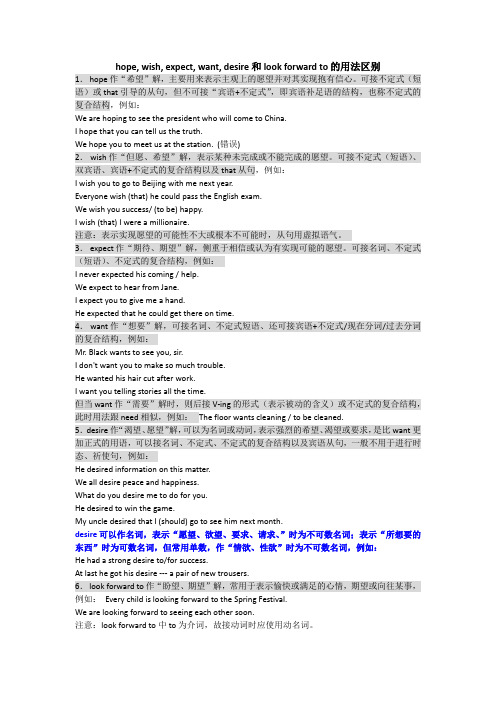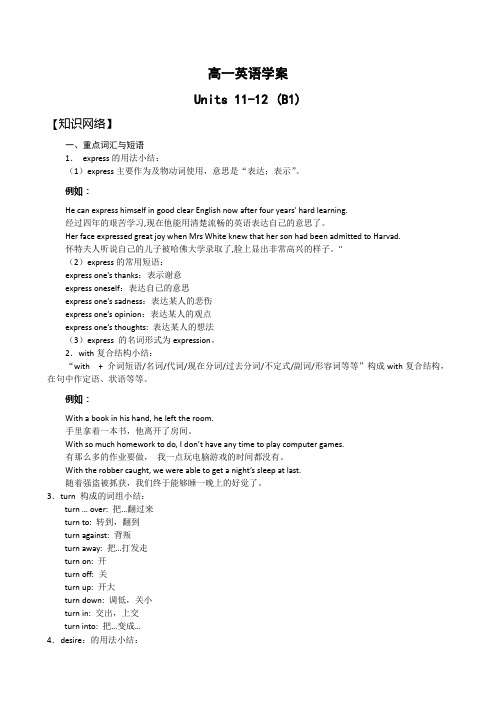Desire 用法
- 格式:doc
- 大小:23.50 KB
- 文档页数:2

hope,wish,expect,want,desire和look forward to的用法区别1.hope作“希望”解,主要用来表示主观上的愿望并对其实现抱有信心。
可接不定式(短语)或that引导的从句,但不可接“宾语+不定式”,即宾语补足语的结构,也称不定式的复合结构,例如:We are hoping to see the president who will come to China.I hope that you can tell us the truth.We hope you to meet us at the station.(错误)2.wish作“但愿、希望”解,表示某种未完成或不能完成的愿望。
可接不定式(短语)、双宾语、宾语+不定式的复合结构以及that从句,例如:I wish you to go to Beijing with me next year.Everyone wish(that)he could pass the English exam.We wish you success/(to be)happy.I wish(that)I were a millionaire.注意:表示实现愿望的可能性不大或根本不可能时,从句用虚拟语气。
3.expect作“期待、期望”解,侧重于相信或认为有实现可能的愿望。
可接名词、不定式(短语)、不定式的复合结构,例如:I never expected his coming/help.We expect to hear from Jane.I expect you to give me a hand.He expected that he could get there on time.4.want作“想要”解,可接名词、不定式短语、还可接宾语+不定式/现在分词/过去分词的复合结构,例如:Mr.Black wants to see you,sir.I don't want you to make so much trouble.He wanted his hair cut after work.I want you telling stories all the time.但当want作“需要”解时,则后接V-ing的形式(表示被动的含义)或不定式的复合结构,此时用法跟need相似,例如:The floor wants cleaning/to be cleaned.5.desire作“渴望、愿望”解,可以为名词或动词,表示强烈的希望、渴望或要求,是比want更加正式的用语,可以接名词、不定式、不定式的复合结构以及宾语从句,一般不用于进行时态、祈使句,例如:He desired information on this matter.We all desire peace and happiness.What do you desire me to do for you.He desired to win the game.My uncle desired that I(should)go to see him next month.desire可以作名词,表示“愿望、欲望、要求、请求、”时为不可数名词;表示“所想要的东西”时为可数名词,但常用单数,作“情欲、性欲”时为不可数名词,例如:He had a strong desire to/for success.At last he got his desire --- a pair of new trousers.6.look forward to作“盼望、期望”解,常用于表示愉快或满足的心情,期望或向往某事,例如:Every child is looking forward to the Spring Festival.We are looking forward to seeing each other soon.注意:look forward to中to为介词,故接动词时应使用动名词。

desire的用法和例句Desires are inherent to human nature and play an essential role in driving our actions and choices. Understanding the usage of "desire" and its various contexts allows us to communicate effectively and express our wants and needs. In this article, we will explore the different ways "desire" can be used, providing examples along the way.1. Desire as a verb:Firstly, "desire" can be used as a verb, expressing a strong wish or longing for something. It reflects a craving or yearning for a particular outcome or possession. For example:- She desires success and is willing to work hard to achieve it.- He desires a new car to fulfill his lifelong dream of driving a luxury vehicle.- They desire peace and harmony in their community, striving for mutual understanding and respect.2. Desire as a noun:Secondly, "desire" can also function as a noun, representing a want or craving for something. It is an abstract concept embodying our deepest wishes and aspirations. Here are a few examples:- His desire to travel the world grew stronger with each passing year.- The artist expresses her desires through her vibrant and emotional paintings.- The main character's desires and ambitions drive the plot of the novel, creating tension and conflict.3. Desire followed by an infinitive:Furthermore, "desire" can be followed by an infinitive verb to express a request or a strong preference for something to happen. It implies that one wants or requires a particular action to be carried out. Consider the following examples:- I desire to learn French before my trip to Paris next year.- The team leader desires to see improved communication among team members.- We desire everyone to arrive on time for the meeting, as punctuality is crucial.4. Desire for + noun/noun phrase:"Desire" can also be followed by the preposition "for" and a noun or noun phrase, indicating a strong yearning or wish for a specific thing or state. Here are some examples:- She has a strong desire for independence and self-sufficiency.- The child's desire for a puppy was fulfilled on her birthday.- The company's desire for growth propelled them to expand into new global markets.5. Expressing conflicting desires:Often, we find ourselves torn between different desires or struggling with conflicting wants. Here's how "desire" can be used in such instances:- She desires stability in her career, but she also desires the freedom to pursue her passions.- His desire for adventure conflicts with his desire for a stable family life.- The character's desire for revenge clashes with his desire to maintain his integrity.In conclusion, desire is a versatile word that can be used as both a verb and noun to express strong wishes, longings, and cravings. It can be followed by an infinitive verb or the preposition "for," depending on the intended meaning. Understanding the varied usage of "desire" enables us to effectively communicate our wantsand needs, conveying our aspirations and motivations.。

desire的用法总结大全(学习版)编制人:__________________审核人:__________________审批人:__________________编制学校:__________________编制时间:____年____月____日序言下载提示:该文档是本店铺精心编制而成的,希望大家下载后,能够帮助大家解决实际问题。
文档下载后可定制修改,请根据实际需要进行调整和使用,谢谢!并且,本店铺为大家提供各种类型的经典范文,如英语单词、英语语法、英语听力、英语知识点、语文知识点、文言文、数学公式、数学知识点、作文大全、其他资料等等,想了解不同范文格式和写法,敬请关注!Download tips: This document is carefully compiled by this editor.I hope that after you download it, it can help you solve practical problems. The document can be customized and modified after downloading, please adjust and use it according to actual needs, thank you!In addition, this shop provides various types of classic sample essays, such as English words, English grammar, English listening, English knowledge points, Chinese knowledge points, classical Chinese, mathematical formulas, mathematics knowledge points, composition books, other materials, etc. Learn about the different formats and writing styles of sample essays, so stay tuned!desire的用法总结大全desire的意思vt. 希望;渴望;要求;请求n. 愿望;欲望;希望;请求vi. 有希望;期望;愿望;想望desire的用法用作名词(n.)They have to inhibit wrong desires.他们不得不制止错误的想法。

desire宾语从句-概述说明以及解释1.引言1.1 概述概述在日常的语言交流中,我们经常会表达自己的欲望和愿望。
而这些欲望和愿望往往需要通过特定的句式来表达,其中宾语从句是一种常用的结构。
本文将重点讨论一种特殊类型的宾语从句——Desire宾语从句。
Desire宾语从句是指在表达愿望或欲望时,使用了特定的句型结构。
它由一个主句和一个引导词引导的从句构成,从句中的动词表达了主句中的愿望或欲望。
通过这种句型,我们可以更准确地表达自己的欲望,使沟通更加清晰和有效。
在本文中,我们将首先给出Desire的定义和相关背景知识,以帮助读者对Desire宾语从句有更全面的了解。
接着,我们将详细介绍Desire宾语从句的概念和特点,包括其基本结构、语法规则和常见的使用方式。
通过对这些内容的学习,读者可以更好地掌握Desire宾语从句的应用技巧,以及避免常见的错误用法。
最后,在结论部分,我们将总结Desire宾语从句的重要性。
Desire宾语从句不仅可以帮助我们更准确地表达自己的愿望和欲望,还可以提高我们的语言表达能力和沟通效果。
同时,我们还将展望Desire宾语从句的未来研究方向,希望能为语言学习者和研究者提供一些参考和启示。
通过本文的阅读,读者可以对Desire宾语从句有更深入的了解,并能够在实际应用中运用自如。
正如著名学者所说,掌握Desire宾语从句是提高语言表达能力的重要一环。
让我们一起深入学习和研究Desire宾语从句,提升我们的语言水平和沟通能力。
1.2文章结构1.2 文章结构文章的结构是指文章的组织框架和布局。
在本文中,作者将采用以下结构来展开讨论关于Desire宾语从句的内容:引言: 在引言部分,我们将简要概述本文的主要内容,介绍Desire宾语从句的背景和定义,并对本文的目的进行说明。
正文: 正文部分将分为两个主要部分来介绍Desire宾语从句的概念和特点。
首先,我们将详细阐述Desire的定义和背景,包括其在语法学和语用学领域的研究现状和相关理论。

desire用法归纳关键信息项:1、 desire 作动词的用法及物动词用法不及物动词用法2、 desire 作名词的用法可数名词用法不可数名词用法3、 desire 的常见搭配与动词的搭配与介词的搭配4、 desire 相关的句型表达愿望的句型强调愿望的句型11 desire 作动词的用法111 及物动词用法desire 作及物动词时,其后通常接名词、代词、动词不定式或宾语从句作宾语。
例如:He desires success (他渴望成功。
)She desires a new car (她渴望一辆新车。
)We desire to go on vacation (我们渴望去度假。
)I desire that you (should) come at once (我希望你马上来。
)在宾语从句中,谓语动词常用“should +动词原形”,should 可以省略。
112 不及物动词用法desire 作不及物动词时,常与 for 连用,表示“渴望得到;渴望”。
例如:He desires for fame (他渴望成名。
)They desire for a peaceful life (他们渴望平静的生活。
)12 desire 作名词的用法121 可数名词用法当 desire 表示“愿望;欲望;渴望”时,为可数名词。
例如:Her desires are many (她的愿望很多。
)He has few desires (他几乎没什么欲望。
)122 不可数名词用法当 desire 表示“强烈的愿望;渴望”时,为不可数名词。
例如:a burning desire (强烈的愿望)She has a great desire for knowledge (她有强烈的求知欲。
)13 desire 的常见搭配131 与动词的搭配常见的与 desire 搭配的动词有:fulfill/gratify(满足)、arouse/stimulate(激起)、express(表达)等。

高一英语学案Units 11-12 (B1)【知识网络】一、重点词汇与短语1.express的用法小结:(1)express主要作为及物动词使用,意思是“表达;表示”。
例如:He can express himself in good clear English now after four years' hard learning.经过四年的艰苦学习,现在他能用清楚流畅的英语表达自己的意思了。
Her face expressed great joy when Mrs White knew that her son had been admitted to Harvad.怀特夫人听说自己的儿子被哈佛大学录取了,脸上显出非常高兴的样子。
"(2)express的常用短语:express one’s thanks:表示谢意express oneself:表达自己的意思express one’s sadness:表达某人的悲伤express one’s opinion:表达某人的观点express one’s thoughts: 表达某人的想法(3)express 的名词形式为expression。
2.with复合结构小结:“with+ 介词短语/名词/代词/现在分词/过去分词/不定式/副词/形容词等等”构成with复合结构,在句中作定语、状语等等。
例如:With a book in his hand, he left the room.手里拿着一本书,他离开了房间。
With so much homework to do, I don’t have any time to play computer games.有那么多的作业要做,我一点玩电脑游戏的时间都没有。
With the robber caught, we were able to get a night’s sleep at last.随着强盗被抓获,我们终于能够睡一晚上的好觉了。
WORDS & EXPRESSIONS:desire[观察] 观察desire在下列句子中的词性、含义及用法。
1. His lifelong desire to live in the country was realized at last.2. They have a strong desire for independence.3. He has a desire that his book (should) reach as many people as possible.4. All parents desire more education for their children.5. We always desire to live in peace with our neighbours.6. The judge desires that you (should) come at once.[归纳]★desire作名词时,意为“渴望;欲望;渴求”,后可接动词不定式(句1)、______ +名词(句2)或that 从句(谓语动词用虚拟语气)(句3)。
★desire作动词时,意为“希望得到;想要”,后可接名词(句4)、动词不定式(句5)或______从句(句6)。
[小试] 将下列句子翻译成英语。
1. 很显然,他们并不渴望和平。
2. 她让你马上去见她。
alarm[匹配] 在括号中填出与alarm相对应的词性及含义。
1. The fire alarm rang and everyone ran out of the building. ( )2. I felt a growing sense of alarm when he did not return that night. ( )3. He is afraid of waking up late, so he always has an alarm on his bedside table. (n.①)4. The noise of the shots alarmed the enemy. ( )5. The captain knew there was an engine fault but didn’t want to alarm the passengers. ( vt.)n. ①an alarm clock ②a warning sound or signal③a feeling of fear or worryvt. to make sb. anxious or afraid[点拨]alarm既可作名词也可作动词,作名词时,意为“警报;惊恐;闹钟”;作动词时,意为“惊动;使警觉;使惊恐”。
人教版高中英语选修七Unit2知识点总结Unit 2 Robots一、语言要点IV 重点词汇1. desire n.渴望vt.想要[重点用法]desire sth.渴望得到某物desire to do sth.希望/渴望做某事desire that sb.(should) do要求……have a desire for sth./to do sth.渴望得到某物/希望做某事at one’s desire照某人的希望[典例]1) We all desire happiness and health.我们都希望幸福健康。
2) Everyone has a desire for success, but no everyone desire to get rich.每个人都渴望成功,但并非人人都渴望金钱。
3) He desires you to go to see him at once.他要求你马上去见他。
=he desires that you should go to see him at once.2.satisfaction n.满意[重点用法]satisfactory n. 满意的,satisfy v. 满足, 使满意,demand satisfaction要求赔偿;feel satisfaction at ... 对感到满意find satisfaction in对...感到满意to sb.'s satisfaction (to the satisfaction of sb.)达到使某人满意的程度with satisfaction满意地[典例]1) At last, the whole class found satisfaction in their work.最终,全班都对他们的工作感到满意。
2) What he promised could not satisfy his family.他的许诺并未能使他的家人满意。
英语中,desire, expect 和look forward to 都有“期待、盼望”的意思,今天我们一起学习一下它们的用法区别。
1. desire: 表示强烈的希望、渴望,可以接名词、不定式和从句。
一般不用于进行时态。
例句1:We all desire peace and happiness.
我们都渴望和平和幸福。
例句2:She desired to see him again.
她希望再次见到他。
2. expect: 侧重于相信或认为有实现可能的愿望。
可接名词和不定式。
例句3:We expect to meet her next week.
我们期望下周能见到她。
例句4:His rivals knew that they could expect no quarter from such a ruthless adversary.
他的竞争者明白,不能期望如此残忍的对手发善心。
3. look forward to: 常用于表示愉快或满足的心情、期待。
例句5:Every child is looking forward to the Spring Festival.
每个孩子都盼望春节。
例句6:I am looking forward to seeing you next week.
期等下周见到你。
注意,这里的to 是介词,而不是不定式,后面要接名词、代词或动词的ing 形式。
hope, wish, expect, want, desire和look forward to的用法区别(转载)1.hope作“希望”解,主要用来表示主观上的愿望并对其实现抱有信心。
可接不定式(短语)或that引导的从句,但不可接“宾语+不定式”,即宾语补足语的结构,也称不定式的复合结构,例如:We are hoping to see the president who will come to China.I hope that you can tell us the truth.We hope you to meet us at the station. (错误)2.wish作“但愿、希望”解,表示某种未完成或不能完成的愿望。
可接不定式(短语)、双宾语、宾语+不定式的复合结构以及that从句,例如:I wish you to go to Beijing with me next year.Everyone wish (that) he could pass the English exam.We wish you success/ (to be) happy.I wish (that) I were a millionaire.注意:表示实现愿望的可能性不大或根本不可能时,从句用虚拟语气。
3.expect作“期待、期望”解,侧重于相信或认为有实现可能的愿望。
可接名词、不定式(短语)、不定式的复合结构,例如:I never expected his coming/help.We expect to hear from Jane.I expect you to give me a hand.He expected that he could get there on time.4.want作“想要”解,可接名词、不定式短语、还可接宾语+不定式/现在分词/过去分词的复合结构,例如:A Mr. Black wants to see you, sir.I don’t want you to make so much trouble.He wanted his hair cut after work.I want you telling stories all the time.但当want作“需要”解时,则后接V-ing的形式(表示被动的含义)或不定式的复合结构,此时用法跟need相似,例如:The floor wants cleaning/to be cleaned.5.desire作“渴望、愿望”解,可以为名词或动词,表示强烈的希望、渴望或要求,是比want更加正式的用语,可以接名词、不定式、不定式的复合结构以及宾语从句,一般不用于进行时态、祈使句,例如:He desired information on this matter.We all desire peace and happiness.What do you desire me to do for you.He desired to win the game.My uncle desired that I (should) go to see him next month.desire可以作名词,表示“愿望、欲望、要求、请求、”时为不可数名词;表示“所想要的东西”时为可数名词,但常用单数,作“情欲、性欲”时为不可数名词,例如:He had a strong desire to/for success.At last he got his desire --- a pair of new trousers.6.look forward to作“盼望、期望”解,常用于表示愉快或满足的心情,期望或向往某事,例如:Every child is looking forward to the Spring Festival.We are looking forward to seeing each other soon.注意:look forward to中to为介词,故接动词时应使用动名词。
Desire 用法
vt. 想要, 意欲, 希望 要求, 请求 (to do ,that 从句) (从句谓语用should+动词原型)n. 愿望,心愿,要求(for ,of, to do);欲望,渴望。
He desired a college education. 他想受到大学教育。
They desire me to return soon. 他们要我快点回来。
I desire an immediate answer of his. 我请他立即回信。
She desires that you (should) see her at once. 她要你立即见她。
习惯用语
at sb.'s desire 应某人的要求 be all one can desire 令人十分满意, 好得不能再好了 by desire 应邀 have a strong desire to do sth. 迫切想做某事 leave much to be desired 还有许多不足之处, 还有许多地方有待改进 leave nothing to be desired 完美无缺 leave little to be desired 完美无缺 one's heart's desire 心愿, 渴望得到的东西 the heart's desire 心愿, 渴望得到的东西
desire wish want 区别 都含“需要或希望得到”的意思。
desire属正式用语, 可代替wish 和want,强调“主观愿望的热切性”, 含有“强烈希望做某事”的意思, 如: He got the book he desired. 他得到了他渴望得到的那本书。
wish语气比desire弱, 一般用于“难以实现或不可能实现的愿望”, 强调“主语的主观愿望”, 指“希望”、“愿”、“想”, 如: I wish I could have a new car. 我多么希望有一辆新车(我要是有一辆新车就好了)。
want 多用于口语式普通场合, 指“想”、“要”或“需要”, 表示“较弱的偏爱、选择”或“强烈的需要、热爱”, 如: I want a book. 我要一本书。
◆他要求立即答复。
误:He desires for an immediate answer.
正:He desires an immediate answer.
析:desire(期望,要求)是及物动词,后接名词作宾语时,无需用任何介词。
顺便说一句,desire若用作名词,其后可以接介词for,如:He has a strong desire for success. (他渴望成功)。
◆她希望住在乡下。
误:She desires living in the country.
正:She desires to live in the country.
析:desire(渴望,期望)后可接不定式,但不接动名词。
◆我们要求她马上把信打出来。
误:We desire that she types the letter at once.
正:We desire that she (should) type the letter at once.
正:We desire her to type the letter at once.
析:desire(要求)后接that 从句时,其谓语通常用“(should)+动词原形”这样的虚拟语气形式。
另外,也可用不定式的复合结构来表示此意。
◆他有强烈的成功欲望。
误:He has a strong desire for [of] succeeding.
正:He has a strong desire for success.
正:He has a strong desire to succeed.
析:表示“做某事的愿望”,名词desire(愿望,欲望) 后通常接不定式,在现代英语中通常不接of [for] doing sth 这样的形式。
不过,对于名词可用for,又如:have no desire for wealth(没有求富的欲望)。